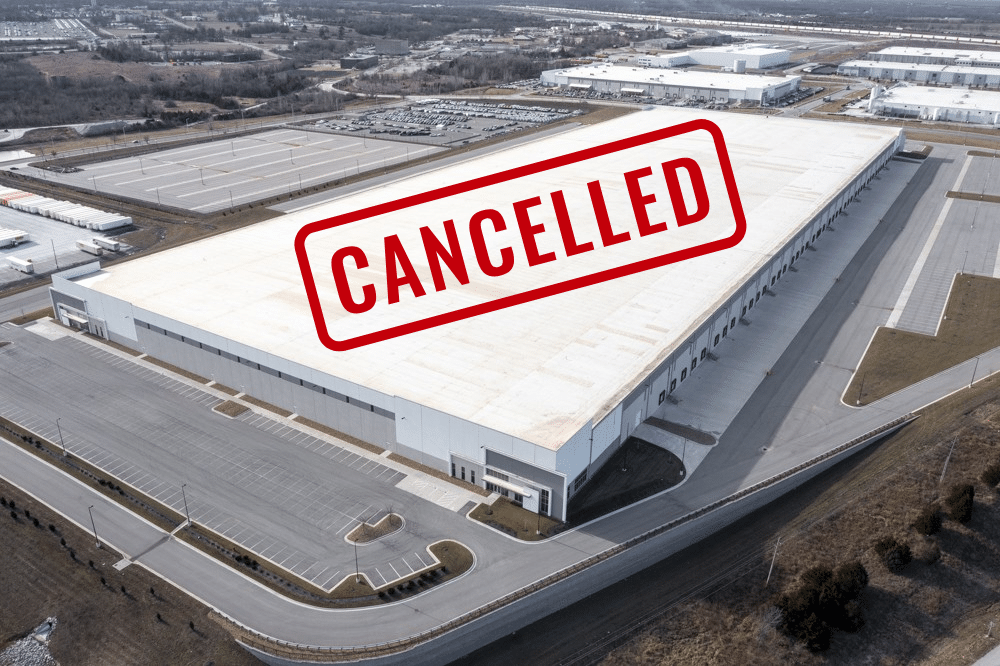
Platform Ventures, the Kansas City investment firm at the center of a firestorm over its plans to sell a massive south Kansas City warehouse to the federal government for use as an ICE detention center, announced today that it is “not moving forward” with the sale.
The announcement comes after weeks of sustained, escalating mass protests, student walkouts, a national general strike, business shutdowns, and relentless community organizing that made Kansas City a flashpoint in the national resistance to the Trump administration’s kidnapping and concentration camp machine.
Let us be absolutely clear about what happened here: the people of Kansas City forced Platform Ventures’ hand.
This was not a corporate change of heart. This was not Platform Ventures suddenly discovering a conscience after secretly negotiating to hand over a publicly subsidized, $80 million warehouse to be converted into a 7,500-bed concentration camp. Ultimately, it was a calculated business decision made under extraordinary pressure from a community that refused to be complicit in the machinery of mass incarceration and deportation.
What They Said
In a statement released February 12, Platform Ventures claimed it “chose not to move forward” because “the terms no longer met our fiduciary requirements for a timely closing.”
To be explicitly clear, they are not saying it was wrong. They are also not saying they oppose detention. They are saying the deal stopped making financial sense. The company also cited “baseless speculation, inaccurate narratives and serious threats toward leadership” as motivating the statement.
There was nothing baseless about any of it. ICE agents were physically spotted touring the warehouse on January 15. Port KC documents confirmed the plan. Jackson County Legislature Chair Manny Abarca confirmed that a DHS supervisor told him the facility would hold at least 7,500 beds and was planned to open by the end of 2026. Platform Ventures’ own previous statement confirmed “all negotiations are complete.”
The speculation was in fact confirmed by various sources, repeatedly, by the company’s own words and by the federal agents walking through the building.
What Actually Killed the Deal: The People
What Platform Ventures will not say, and what mainstream outlets may underreport, is the extraordinary, multiracial, cross-generational movement that erupted across the Kansas City metro in the last month.
Organizations like Decarcerate KC, Advocates for Immigrant Rights and Reconciliation (AIRR), the Missouri Workers Center, Stand Up KC, and dozens of other grassroots groups mobilized with a speed and ferocity that corporate Kansas City was not prepared for.
On January 15, the day ICE agents toured the warehouse, protesters were already on site. Jackson County Legislature Chair Manny Abarca drove to the site himself and was confronted by ICE officers who told him he wasn’t allowed on the publicly subsidized property. He recorded the entire interaction.
That same day, the Kansas City Council, at Mayor Quinton Lucas’ request, passed a five-year moratorium on non-municipal detention facilities within city limits.
On January 20, hundreds gathered across the metro for protests and immigrant rights trainings. Students at Staley High School in North Kansas City staged a walkout with hundreds of students marching against ICE. In Overland Park, North Kansas City, Raytown South, Grandview, Wyandotte, student protests have drawn students and adults alike. Across the country, student walkouts have become one of the most powerful expressions of resistance, with young people refusing to sit quietly while their classmates’ families are targeted.
On January 24, hundreds braved single-digit temperatures and snow to march through downtown Kansas City as part of a national shutdown. Protesters marched from Oppenstein Park directly to properties owned by Platform Ventures on Baltimore Street. Decarcerate KC’s Pateisha Royal vociferiously denounced the planned concentration camp. The Missouri Workers Center’s Terrence Wise said what so many were feeling: “I’m a father of three, and I cannot accept that ICE just last night kidnapped a 2-year-old, whisking her off to the sort of detention facility they want to build here.”
Dozens of Kansas City businesses closed their doors or donated proceeds to AIRR KC and other immigration defense organizations in an unprecedented show of economic solidarity.
Port KC voted to sever all ties with Platform Ventures on February 9.
Leavenworth saw over 100 protesters rally against the separate CoreCivic detention center proposal. Representatives Emanuel Cleaver and Sharice Davids sent letters to DHS denouncing the planned operation.
The walls closed in from every direction because the people closed them.
It’s Cause to Celebrate. It’s Also Cause to Organize.
Platform Ventures’ statement is carefully worded. They said they are “not actively engaged” with the U.S. government or “any other prospective purchaser” for the I-49 property. They did not say they would never sell. They did not say the federal government has abandoned its plans for a mega-detention facility in the Kansas City metro. They did not say they oppose the caging of immigrants.
The CoreCivic facility in Leavenworth is still moving forward. ICE arrests in the Kansas City metro have surged in Missouri and nearly tripled in Kansas from January to October 2025. Masked federal agents are still roving our streets. The $45 billion allocated for ICE detention in the “Big Beautiful Bill” is still law. The administration is still targeting our neighbors.
What happened here is a victory, and it belongs to every single person who showed up in the cold, who walked out of class, who closed their shop, who marched to Platform Ventures’ front door, who trained their neighbors on their constitutional rights, who made phone calls, who refused to look away.
But a victory and a conclusion are two different things.
The fight for Kansas City continues. The fight against the carceral state continues. The fight for our immigrant neighbors, our unhoused neighbors, our Black and brown communities targeted by every arm of the state continues.
Platform Ventures backed down because organized people are more powerful than organized money. Remember that. And stay in the streets.
This is a developing story. The Kansas City Defender will continue to provide updates.
Resources: If you or someone you know needs immigration legal assistance, contact AIRR KC (Advocates for Immigrant Rights and Reconciliation). Know your rights: you have the right to remain silent, the right to refuse entry without a judicial warrant, and the right to an attorney.
The post BREAKING: Platform Ventures Backs Down From ICE Detention Center Sale After Weeks of Mass Organizing and Protest appeared first on The Kansas City Defender.




